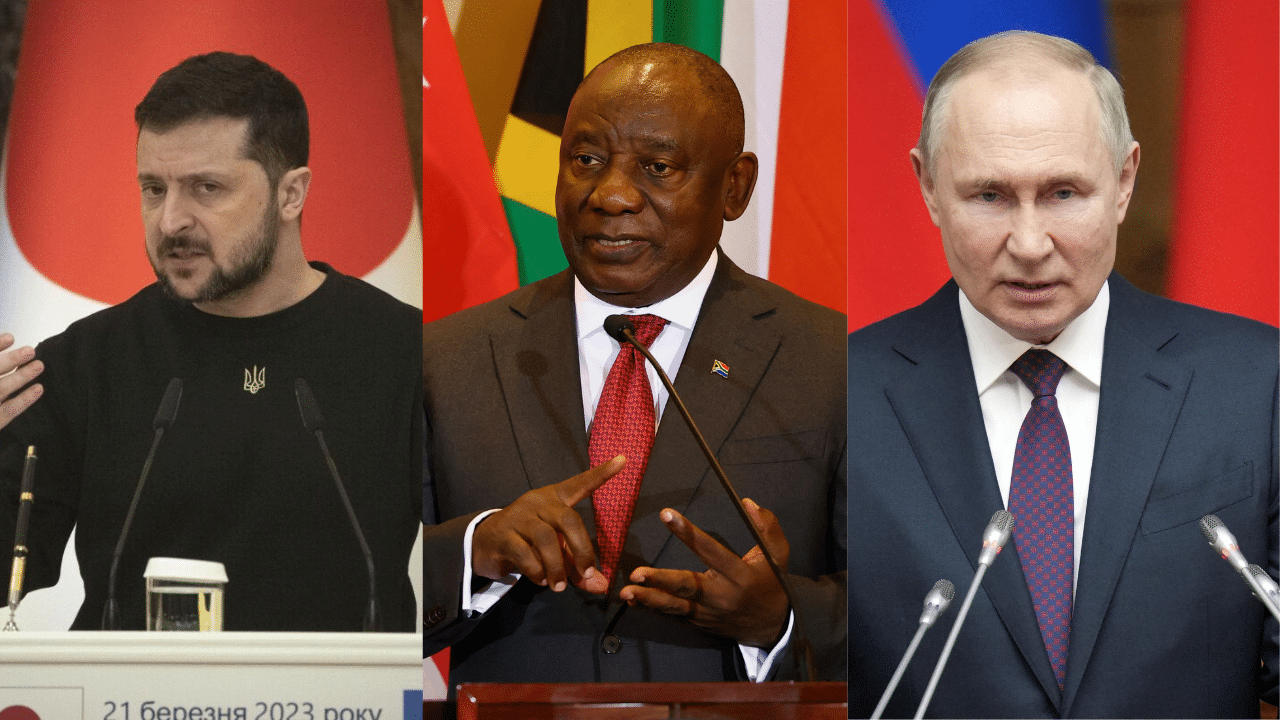Six African leaders are seeking to bring Kiev to the negotiating table for peace talks with Moscow, even as Russian troops remain in annexed Ukrainian oblasts, Pretoria said on Monday. The peace mission is expected to visit both countries’ capitals early next month.
South African President Cyril Ramaphosa will insist that his Ukrainian counterpart, Volodymyr Zelensky, agree to enter peace talks before Russian troops leave his country. This is a necessary step for negotiations to begin, which Kiev has so far ruled out.
Zelensky’s government holds the position that Russian troops must leave all the provinces Moscow has annexed since the war began. Ukraine’s leadership has also set as a non-starter precondition that Moscow must vacate the Crimean peninsula, which Russia annexed in 2014 following a US-backed coup in Kiev.
Conversely, in order for talks to succeed, the Kremlin demands that Kiev recognize Russia’s sovereignty over these territories – including Crimea, which has hosted the Russian Navy’s Black Sea fleet for nearly 250 years. Since 2014, polling has demonstrated overwhelming support among Crimeans for rejoining the Russian Federation, which originally handed over the peninsula to Ukrainian control in the Soviet era.
“First is the cessation of hostilities. Second is a framework for lasting peace,” South African Presidency Spokesman Vincent Magwenya explained, with this chasm in mind. Ramaphosa announced the peace mission last week. The initiative is led by President Macky Sall of Senegal, and includes the leaders of the Republic of the Congo, Uganda, Egypt, and Zambia.
According to Reuters, Ukraine’s ambassador to South Africa, Liubov Abravitova, responded emphatically in a text message, saying ”My President made it very clear … [There will be] no talks between Ukraine and Russia unless Russians leave our territory within its internationally recognized borders.”
Abravitova added, however, that Kiev ”will receive all delegates and speak to them.” Russian Foreign Minister Sergey Lavrov has previously said Moscow welcomes the proposals from the African leaders and Brasília.
For Washington’s part, a State Department spokesperson said it would “welcome any successful effort to convince Vladimir Putin to end his war of territorial aggression.”
Beijing is also working to foster talks between the warring states. In February, China released a 12-point peace plan which calls for negotiations and a ceasefire, respect for national sovereignty, the stabilization of supply chains, an end to unilateral sanctions, a response to humanitarian crises and a reduction of strategic risks.
Leading the effort is Li Hui, China’s special representative for Eurasian affairs, who visited Kiev last week and was told “Ukraine does not accept any proposals that would involve the loss of its territories or the freezing of the conflict.”
After China made its peace plan public, the White House dismissed it out of hand and explicitly opposed any potential ceasefire or freezing of the conflict. Since then, reports have emerged indicating the US is, in fact, interested in a possible truce similar to the situation on the Korean peninsula. However, whether there is a pause in fighting or not, the administration plans to continue enhancing Ukraine’s interoperability with the NATO alliance, arming Kiev and building up the country as a bulwark of the Washington-led bloc on Russia’s doorstep. US officials are well aware that Moscow views possible Ukrainian membership in the North Atlantic alliance as the “brightest of all redlines.”
Shortly after Putin’s February 2022 invasion commenced, there were nearly successful efforts made by Ankara and Tel Aviv to broker an agreement between the two sides. The talks in March 2022, hosted by Turkey, would have seen Russia pull back to the lines it held before the invasion was launched, while Kiev would have been expected to maintain a neutral status and renounce its aspirations for NATO membership.
Such critical opportunities were deliberately squandered by the United States and its allies – namely former British Prime Minister Boris Johnson, who applied significant pressure on Zelensky to refuse any concessions and keep fighting the war. Later in April, Pentagon chief Lloyd Austin stated that the goal of the Washington-led proxy war is “weakening” Russia.








